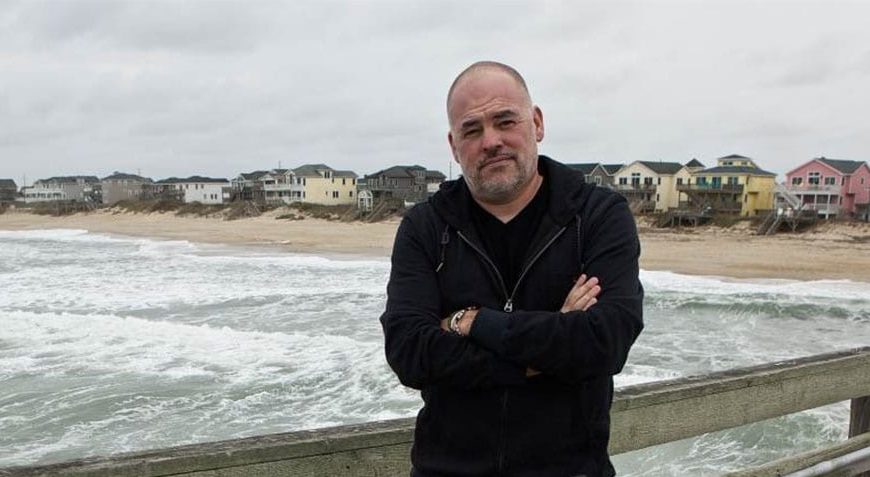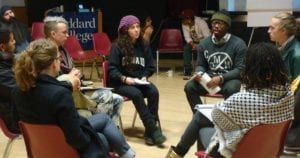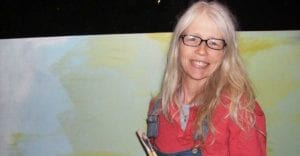 (An adaptation of the Spring 2016 Vermont Commencement Address)
(An adaptation of the Spring 2016 Vermont Commencement Address)
As the child of immigrants, my parents decided that they needed to send me to an after school program to learn my ancestral language. So every Wednesday, a little grey van picked me up after my schoolday was over, and took me and about a dozen other English-Cypriot children to our weekly two-hour Greek Language classes. The teacher was Greek—as in Greek from Greece, and not from the recently-liberated-from-the-British, eleven-times-colonized, tiny island called Cyprus from where my parents and the parents of all the other children in the van hailed—so she spoke in an elevated dialect, using a vocabulary that I never heard used in the homes of the immigrant community in which I was raised. In fact, a lot of the time when she spoke, my classmates and I just stared at her blankly, unable to decipher her sentences. And she stared back at us—half in pity, half in disgust.
I was nine when these lessons began and I formed an instant hatred for them—for many reasons, most of them having to do with the shame associated with a colonized upbringing, but that would be a completely different blogpost. For today, I’m focusing on just one of the reasons: at my regular school I was an excellent student—English felt like home, but Greek, especially the elevated dialect I was being taught, made me feel less than. Later that same year, at school, I won my first national writing competition—the prize was an ink pen and the choice of a book that I could pick for myself from a cardboard box full of remaindered hardbacks.
After browsing, I chose a poetry collection—poems written for an adult audience, dealing with adult themes. Until that moment, I had never read a poetry collection. At school, we only dealt with stories. I had no idea who the poet was; I simply picked the book with the words in it that spoke to me, and when I say spoke to me what I mean is—I read some words on a page and they made my nine-year-old body feel something in a place deep beneath my skin. When I read the poems at night, I felt something. When I read the poems in the morning, I felt something. Whether I was sad or happy, when I read these words I felt something.
But then there was also the weekly Greek Language class, where I was learning new words in a new language, and they did not make me feel anything. Each week my homework was to fold a notebook-page in half—lengthways—and fill half of it by transcribing a Greek paragraph and then using the other half to translate this paragraph into English. Each week, I dutifully folded the page, but tucked within this dutiful fold was my rebellion—I made it deliberately uneven with the smaller side of the page allocated to the Greek words. And I kept up this revolt for quite a while, hoping that the Greek teacher wouldn’t notice the uneven distribution of the two languages.
This worked for a while until one day when I came across a Greek word that looked and sounded beautiful to me. I wrote it out. It was long—it had seven syllables. (More syllables that Constantinople!) I followed the accents above the accented letters and I repeated the word to myself over and over on my walk to school. Aπογοητευμένη. A-bo-yo-i-tev-meh-ni, I said as I meandered, pulling leaves off thickets. A-bo-yo-i-tev-meh-ni, I repeated as I dodged the sidewalk cracks. The word was poetry. I was so mesmerized by its sound that I didn’t even think to ask my parents if they knew what it meant. As far as I was concerned it could have meant delicious or dragonfly; it could have meant dancer or daffodil; it could have meant, well, let me ask you: What does a-bo-yo-i-tev-meh-ni mean to you? (pause)
The next day, when I had to hand in my Greek to English homework, I had gotten so carried away with this word’s music that I’d forgotten to translate the paragraph; and so there, for all to see, was the Greek chunk of writing on the smaller half of the page, and the larger half—where the English should have been—was empty.
The Greek teacher saw the uneven fold; and saw the largeness of the empty space. I was exposed. Terrified. She was much sterner than my English teachers. I was sure she would punish me in the same way as I had seen her do with the other rebellious Cypriot children she looked at with disdain. And I was right. Instead of asking me if I had a reason for the non-completion of my homework, she simply pulled out the ruler and steadied my outstretched hand. I don’t remember how many times she struck me, but I do remember the red marks on my palm and the sting of embarrassment.
So why am I sharing this story with you today? I’ve sharing it because I want to ask you to think about the pricelessness of your imagination.
After all these years, this story still leaves me with an unanswered question: How does a nine-year-old child explain that the reason she did not complete her homework is because she fell in love with a word whose meaning was unknown to her? Though the answer eludes me, the fact that this happened has had a profound effect on my writing life; I have never forgotten that so much of what we do as creative writers feels magical and mysterious. We must honor our imagination, trust our imagination, because it is the most supremely intelligent part of our existence; it knows things before we have located the words.
And this, I think, is similar to what we, as creative writers, have to offer to the world—we’re a kind of collaboratively manifested imagination; we spend our days looking for ‘the best words in the best order’ to express feelings felt in isolation that we believe are shared by humanity, and so we’re driven to commit them to the page or the stage. When our readers or audience recognize in a sentence or in a paragraph or in an entire play or story or poem something they thought they were feeling in isolation, the discovery that this is something shared makes them feel less alone. This is the writer’s gift to the world.
And Lord knows, writers desperately need to be seen giving the world a gift because, let’s face it, we’re an odd breed. We do this thing that requires us to spend so much of our lives on the outside of situations, observing life. (I’m thinking now of the writer who, at her father’s funeral, interrupted a conversation between herself and her mother and sister to go to the bathroom to take notes on what they were talking about so that when the time came to write about her father’s death she would have the details documented.)
And we do this thing that requires us to spend large chunks of our lives in solitude. (I’m thinking now of the writer who, in preparation for a family vacation, packed her printer, reasoning that she could write before everyone woke up, and did not notice her wife and children looking askance as she wrapped the printer in a beach towel.)
And we do this thing that requires unrewarded daily discipline and we do it as if our lives depended on it. (I’m thinking of a writer who handed over her work schedule to a health coach who looked at it in disbelief and she said, “You work seven days a week?” The writer pointed to the dawn hours and said, “That’s not my paid work. That’s when I write.” The coach was confused. “You work a part of every day on something that doesn’t pay?” Perhaps the confusion occurred because the writer had used the word “work.” Perhaps he would have understood if the writer had written, Daily worship at the altar of my imagination.)
Like I said, writers are an odd breed. But we’re also a fortunate breed because we’re passionately connected and committed to our imaginations. As we travel through life we have access to this priceless wonder that has no sell-by date, and is found in every fold of our existence. Our imagination takes every mundane situation and fills it with possibility—no experience is wasted. We find inspiration on the subway ride that we took twice a day for eighteen years. We find inspiration in a newspaper article about the food deliveryman who got stuck in an elevator for two days. We find it in an overheard conversation at the ATM. We find it in the loose change under a sofa cushion. And we find inspiration when we think about the possible meanings of a word in a language other than our own.
I don’t like to give advice because in my life advice has not come from something officially labeled as such, but from the thing that someone said or did that they didn’t even know they were saying or doing—a random throwaway remark or a perfectly-timed gesture—something felt by me as a life-changing moment. For example, My Greek teacher did not know that the ruler’s sting would make certain that the word a-bo-yo-i-tev-meh-ni would be tucked into a fold in my imagination, waiting for the right time to release itself onto the page. And neither did I. But it did. Today, four decades after the fact, the seven-syllabled Greek word I fell in love with as a child inspired this bit of writing, even after forty-six years of knowing that it does not mean daffodil, dragonfly, or dancer.
In Greek, words are assigned masculine and feminine endings—the masculine versions end with an “o” sound, the feminine versions end with an “ee” sound. Simply translated, a-bo-yo-i-tev-meh-ni is the feminine version of the English word disappointed.
The truth is, I found out that a-bo-yo-i-tev-meh-ni meant disappointed soon after outing myself with the unevenly folded page. But knowing what the word meant in English did nothing to reduce its magic and its mystery; my imagination had already claimed it before the dictionary had limited its meaning. And that is priceless. And that is what I want to underscore, here and now: when you sit at your desk ready to fill a blank page, remember that for a writer no experience is wasted—not even the one that leaves you disappointed.







